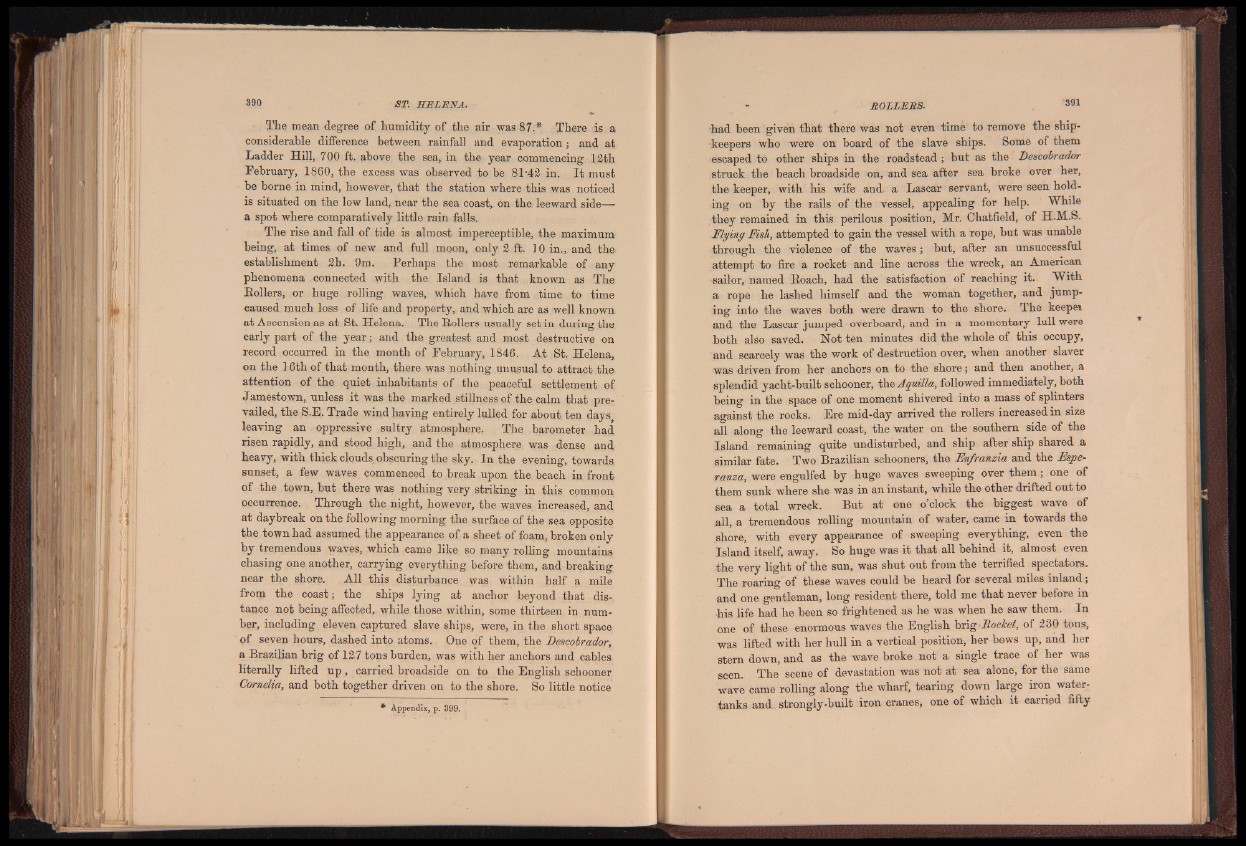
%
The mean degree of humidity of the air was 87.* There is a
considerable difference between rainfall and evaporation; and at
Ladder Hill, 700 ft. above the sea, in the year commencing 12th
February, 1860, the excess was observed to be 81-42 in. I t must
he borne in mind, howe-ver, that the station where this was noticed
is situated on the low land, near the sea coast, on the leeward side—
a spot where comparatively little rain falls.
The rise and fall of tide is almost imperceptible, the maximum
being, at times of new and full moon, only 2 ft. 10 in., and the
establishment 2h. 9m. Perhaps the most remarkable of any
phenomena connected with the Island is that known as The
Boilers, or huge rolling waves, which have from time to time
caused much loss of life and property, and which are as well known
at Ascension as at St. Helena. The Boilers usually set in during the.
early part of the year; and the greatest and most destructive on
record occurred in the month of February, 1846. At St. Helena,
on the 16th of that month, there was nothing unusual to attract the
attention of the quiet inhabitants of the peaceful settlement of
Jamestown, unless it was the marked stillness of the calm that prevailed,
the S.E. Trade wind having entirely lulled for about ten days;
leaving an oppressive sultry atmosphere. The barometer had
risen rapidly, and stood high, and the atmosphere was dense and
heavy, with thick clouds obscuring the sky. In the evening, towards,
sunset, a few waves commenced to break upon the beach in front
of the town, hut there was nothing very striking in this common
occurrence. Through the night, however, the waves increased, and
at daybreak on the following morning the surface of the sea opposite
the town had assumed the appearance of a sheet of foam, broken only
by tremendous waves, which came like so many rolling mountains
chasing one another, carrying everything before them, and breaking
near the shore. All this disturbance was within half a mile
from the coast; the ships lying at anchor beyond that distance
not being affected, while those within, some thirteen in number,
including eleven captured slave ships, were, in the short space
of seven hours, dashed into atoms. One of them, the Descobrador,
a Brazilian brig of 127 tons burden, was with her anchors and cables
literally lifted u p , carried broadside on to the English schooner
Cornelia, and both together driven on to the shore. So little notice
# Appendix, p. 399.
had been given that there was not even time to remove the ship-
■keepers who were on board of the slave ships. Some of them
escaped to other ships in the roadstead; but as the Descobrador
struck the beach broadside on, and sea after sea broke over her,
the keeper, with his wife and. a Lascar servant, were seen holding
on by the rails of the vessel, appealing for help. While
they remained in this perilous position, Mr. Chatfield, of H.M.S.
Dlying Fish, attempted to gain the vessel with a rope, but was unable
through the violence of the waves; but, after an unsuccessful
attempt to fire a rocket and line across the wreck, an American
sailor, named Boach, had the satisfaction of reaching it. With
a rope he lashed himself and the woman together, and jumping
into the waves both were drawn to the shore; The keeper
and the Lascar jumped overboard, and in a momentary lull were
both also saved. Hot ten minutes did the whole of this occupy,
and scarcely was the work of destruction over, when another slaver
was driven from her anchors on to the shore; and then another, a
splendid yacht-built schooner, the Jquilla, followed immediately, both
being in the space of one moment shivered into a mass of splinters
against the rocks. Ere mid-day arrived the rollers increased in size
all along the leeward coast, the water on the southern side of the
Island remaining quite undisturbed, and ship after ship shared a
similar fate. Two Brazilian schooners, the Enfranzia and the Espe-
ranza, were engulfed by huge waves sweeping over th em ; one of
them sunk where she was in an instant, while the other drifted out to
sea a total wreck. But at one o’clock the biggest wave of
all, a tremendous rolling mountain of water, came in towards the
shore, with every appearance of sweeping everything, even the
Island itself, away. So huge was it that all behind it, almost even
the very light of the sun, was shut out from the terrified spectators.
The roaring of these waves could be heard for several miles inland;
and one gentleman, long resident there, told me that never before in
his life had he been so frightened as he was when he saw them. In
one of these enormous waves the English brig Rocket, of 230 tons,
was lifted with her hull in a vertical position, her bows up, and her
stern down, and as the wave broke not a single trace of her was
seen. The scene of devastation was not at sea alone, for the same
wave came rolling along the wharf, tearing down large iron water-
tanks and strongly-built iron cranes, one of which it carried fifty